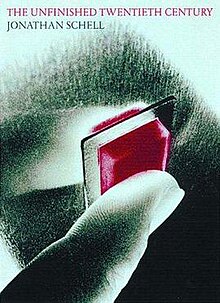In the 2001 book The Unfinished Twentieth Century, author Jonathan Schell suggests that an essential feature of the twentieth century was the development of humankind's capacity for self-destruction, with the rise in many forms of "policies of extermination". Schell goes on to suggest that the world now faces a clear choice between the abolition of all nuclear weapons, and full nuclearization, as the necessary technology and materials diffuse around the globe.[1][2][3][4][5][6]
 First edition | |
| Author | Jonathan Schell |
|---|---|
| Publisher | Verso |
Publication date | August 2001 |
| Pages | 144 pp |
| ISBN | 978-1-85984-780-0 |
| OCLC | 48012948 |
| LC Class | JZ5665 .S34 2001 |
See also
editReferences
edit- ^ Stein, Jeff (11 November 2001). "The Empire Strikes Back. Review of Hit to Kill and The Unfinished Twentieth Century". The New York Times. Retrieved 12 November 2008.
- ^ Weschler, Lawrence (25 June 2000). "Postscript". Los Angeles Times. Archived from the original on 25 May 2011. Retrieved 12 November 2008.
- ^ Franklin, Roger (July–August 2003). "Saving Grace. Review of The Unfinished Twentieth Century by Jonathan Schell". Resurgence. No. 219.
- ^ "The Postwar World". History Today. 53 (11): 81. November 2003.[dead link]
- ^ The Unfinished Twentieth Century at Barnes & Noble
- ^ The Unfinished Twentieth Century at Google Books